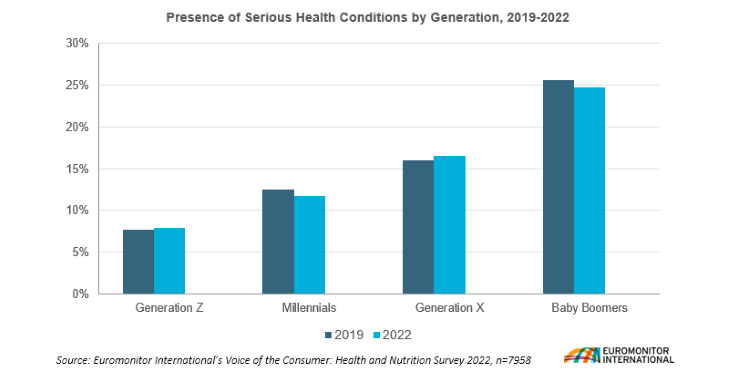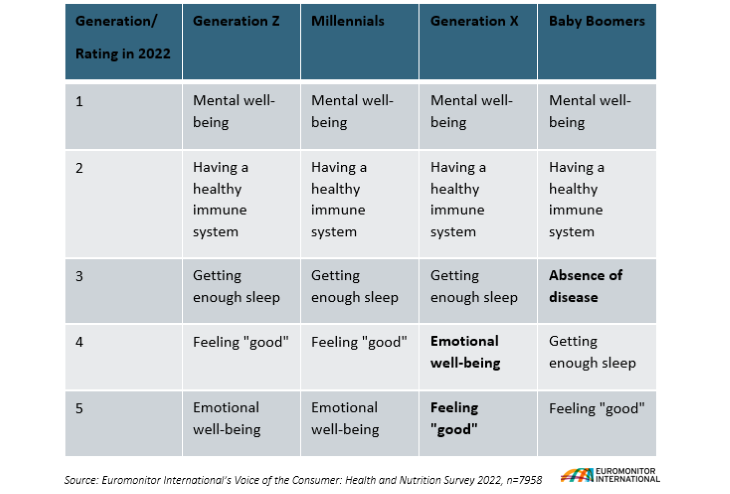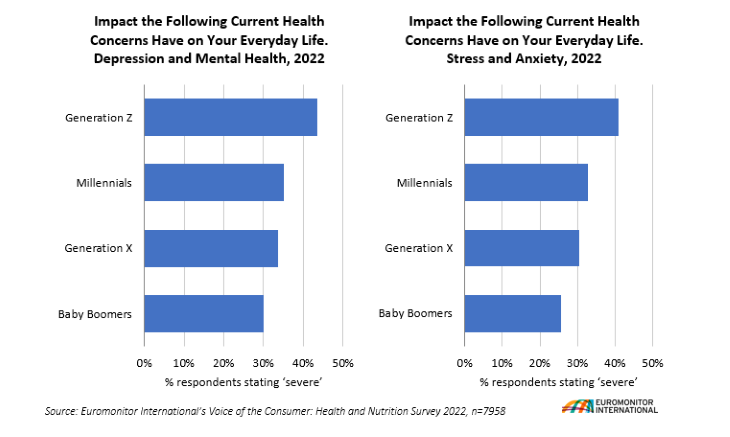Paradoxically, despite the intensive movement towards healthy lifestyles, the global population is becoming increasingly unwell. Improving the quality and reach of healthcare and containing health risks might curb global health deterioration in the long term. Yet, as health is multi-layered and complex, tailored and personalised approaches might be more effective in the short to medium term. This article aims to formulate the top four health strategies using the survey answers and demographic data by four generations: baby boomers, Generation X, millennials and Generation Z*.
Current health status by generation
According to the Euromonitor International’s Voice of the Consumer Health and Nutrition Survey** (from now on referred to as Health and Nutrition Survey) in 2022, 33% of global consumers rated their health as very good or excellent, up from 28% in 2019. Nevertheless, more people also claimed to have severe health conditions - nearly 16% of the population, up from 15% in 2019. In line with the negative ageing effect, baby boomers suffered from serious conditions the most – one in four respondents recorded having serious conditions such as cancer, diabetes, heart disease or other in 2022.
Although ageing is a significant driver for the growing demand for healthcare products and services, young generations, millennials in particular, are extensively aware of and worried about their future health. According to the Health and Nutrition Survey, one in four millennials worries about memory and heart issues, mobility problems, incontinence, and joint and muscle pain. Moreover, one in five feels concerned about vision issues, depression and mental health, obesity, skin health and stress and anxiety in the long term. This makes millennials the most health-aware generation of all.
Perception of health by generation
Logically, health status should contribute significantly to defining health, yielding different health perceptions across the generations. However, according to global respondents, several health megatrends are important enough to define health across all generations. For example, in 2022, “mental well-being” and “getting enough sleep” retained their status as the top health traits, followed by “having a healthy immune system”, which has established importance since the emergence of the pandemic. Echinacea and elderberry in the US, ginseng and mushrooms in China, and turmeric and tulsi in India are some of the products that could further benefit from this trend.
Top Five Health Perceptions by Generation in 2022

Interestingly, while “maintaining a healthy weight” was an important health definition in 2019, in 2022, global respondents across all generations have ranked it down and out of the top five health perceptions list. It appears that as the average BMI is growing and is expected to surpass 25 kg/sq m (while >25 kg/sq m BMI shows overweightness) globally in 2026, and regions such as North America, Australasia, and Latin America are quickly approaching a BMI of 30 kg/sq m (while >30 kg/sq m BMI shows obesity), global populations are increasingly used to being heavier. The perception shift is additionally reinforced by advocates of the body positivity movement, encouraging shifting attention from BMI (as a measure for health) towards healthy nutrition and higher exercise rates.
Top health strategies by generation
Segmenting health consumers by generation has significant implications for all companies trying to cater for health and wellness trends. For example, different product portfolios can be constructed, tailored marketing strategies communicated, and more effective retailing channels can be adopted depending on generational needs. The remainder of the research concentrates on viable health strategies by generation.
In Euromonitor International’s Voice of the Consumers: Lifestyles Survey in 2022, a larger proportion of Generation Z repeatedly reported the high impact of numerous health concerns on their daily lives. Although a particularly large gap between the youngest and the oldest generation (under research) was recorded in stress and anxiety, Generation Z also reported severe suffering from depression and mental health, sleeping problems, eye vision and digestive issues, headaches, memory problems and seasonal allergies. Higher health sensitivity combined with pronounced values such as pragmatism, individualism and social responsibility results in this generation's health strategies oriented at higher yet more conscious spending on health and wellness at the moment, as well as in the future.

Considering the high health awareness and broad digitalisation among millennials, targeting them involves technology and information. Therefore, telehealth and smart health gadgets focusing on preventative health and wellness are interesting for Generation Y and they are also timely. High health awareness also signals the willingness to suspend health deterioration, increasing the demand for preventative solutions. According to the Health and Nutrition Survey in 2022, nearly 31% of millennials regularly used fitness devices, and 32% used fitness and exercise apps - significantly higher than other generations. However, health-related technology was not limited to wearables. For instance, Sengled, the smart lighting company, introduced the Zigbee smart bulb in 2022, which uses radar technology and tracks sleep and other biometric measurements, such as heart rate and body temperature.
For Generation X, social and family status makes this generation extremely important for companies in the health and wellness space. Generation X comprises consumers in their 40s and 50s, who are both primary health caregivers for parents and children, and patients themselves. In addition, these consumers are busy since they are also at the peak of their professional lives. This encourages this generation to strive for convenience and multifunctionality, while demand for health planning tools, such as SimplyBook.me, Zoho Bookings or Appointlet, is growing.
Notably, while the health definition is evolving around holistic wellness for all generations (under the Health Perceptions by Generation table), baby boomers consistently rank “absence of disease” as the top third health definition and “mental well-being” as first. Ageing is a significant driver for baby boomers' health issues and ageing in health and comfort is a major aim, raising the demand for user-friendly technology for this cohort that helps them to keep track of health issues or conditions. From artificial intelligence solutions monitoring various conditions to food supplements enhancing cognitive health and preventing diseases from occurring, the space of play is limitless.
Finally, differentiating by generation according to the health perceptions that are mutual across the generations, such as “mental well-being” and “having a healthy immune system”, might also prove helpful. Just because the health perceptions are unanimous does not mean the offerings should be. Tailored and personalised supplements and vitamins are a great example, playing on the needs of different age cohorts.
Read more on Top Health Trends, or explore How Personalisation is Shaping Health and Beauty Sectors in the webinar.
* Baby boomers refer to the population born during the demographic post-World War II baby boom between the years 1946 and 1964.
Generation X is the generation born after the Western post-World War II baby boom ended between the years 1965 and 1979.
Millennials refer to the population group born from 1980 to 1994. It is also known as Generation Y or the Echo Boomers - the demographic cohort following Generation X.
Generation Z is a common name for the group of people born between 1995 and 2009.
** Euromonitor International’s Voice of the Consumer: Health and Nutrition Survey results are drawn from nearly 8,000 online consumers ranging in age from 15 to 65+ years. The Health and Nutrition Survey is fielded annually and in 2022 covered 20 markets.
